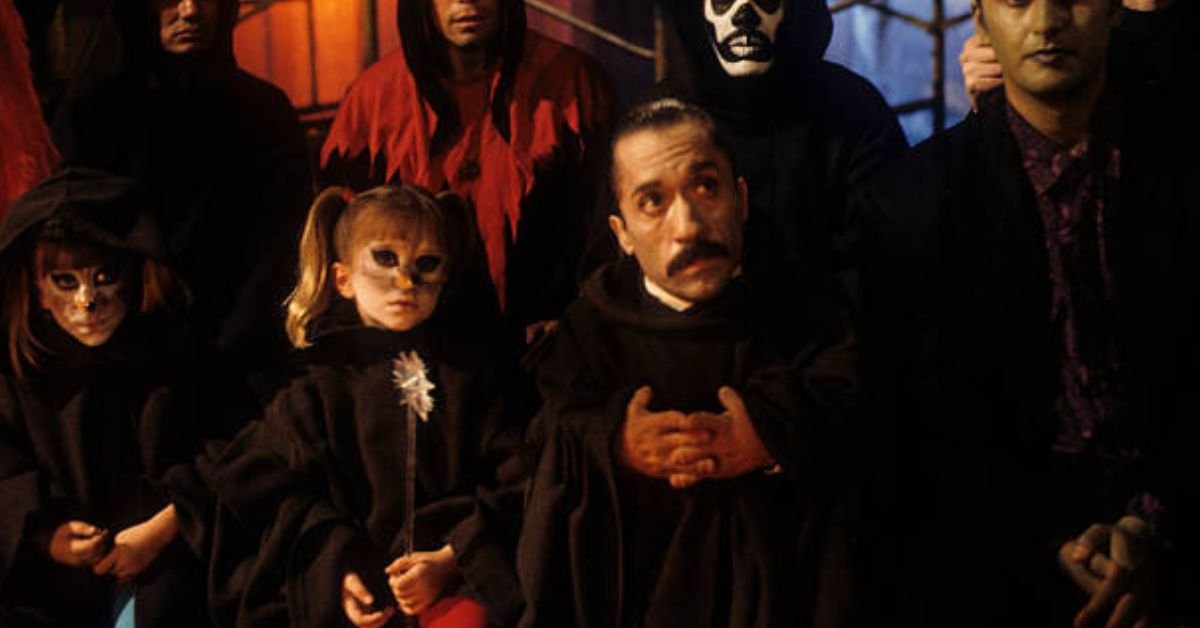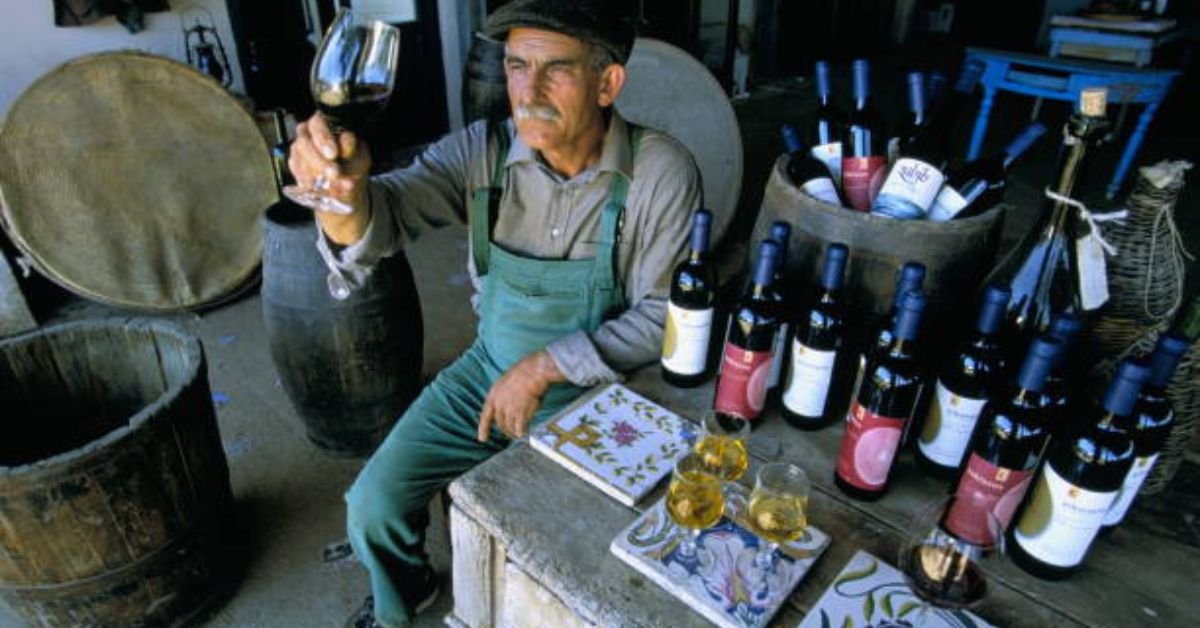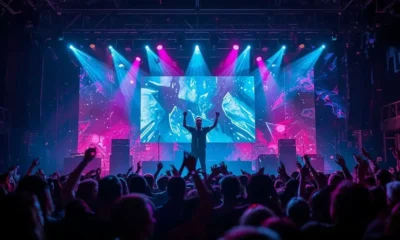ENTERTAINMENT
Phillips Marcelo: Crafting Sound into Soul

Phillips Marcelo: The Sonic Architect of Modern Brazilian Music
Phillips Marcelo In today’s music landscape, where genres merge and cultures collide in mesmerizing harmony, Phillips Marcelo stands out as a pioneering force. Known for blending electronic textures with traditional Brazilian rhythms, this São Paulo-born composer, producer, and sound designer has quietly redefined what it means to be a 21st-century musician. While his name may not be mainstream to all, within the circles of global music connoisseurs and indie innovators, Marcelo is regarded as one of the most forward-thinking artists to emerge from South America in recent decades.
A Brazilian Soul Shaped by Sonic Curiosity
Growing up in São Paulo, one of Brazil’s most diverse cultural hubs, Marcelo was exposed to a rich tapestry of sound from an early age. Street samba mingled with the echoes of bossa nova, while hip-hop, jazz, and electronic music pulsed through underground clubs. This sonic melting pot became the foundation of his musical sensibilities.
Rather than following a singular path, Marcelo immersed himself in a variety of genres. His early influences ranged from Brazilian legends like João Gilberto and Hermeto Pascoal to avant-garde electronic icons such as Aphex Twin and Brian Eno. These contrasting inspirations fostered a unique style—one that respects the past while building audacious bridges toward the future.
Crafting a Signature Sound: Fusion of Roots and Innovation
Marcelo’s music is not easily categorized. It’s where Afro-Brazilian percussion meets ambient loops, and analog synths swirl through complex jazz harmonies. He often records traditional instruments like berimbau or cuíca, only to digitally manipulate them into textures unrecognizable from their original forms. This fusion is not gimmicky—it’s intentional, rooted in deep cultural reverence and a relentless drive for innovation.
Each track feels like a journey through both physical and emotional landscapes. Whether it’s an introspective ambient piece or a high-energy electronic samba, Marcelo’s compositions evoke movement, introspection, and soul. His work challenges listeners to reconsider what Brazilian music is—and what it can become in a digitally connected world.
Independent Spirit, Global Reach
Despite his underground reputation, Marcelo’s influence spans continents. He has released several albums through independent music labels across Europe and Latin America, gaining a devoted international following. His songs have appeared in film scores, modern dance performances, and even in wellness and meditation playlists curated by major platforms like Spotify and Apple Music.
His 2022 album Urban Folklore was a turning point. Recorded during a retreat in Bahia and finalized in a Berlin studio, the album seamlessly weaves Afro-Brazilian rhythms with minimalist piano sequences and ambient electronic backdrops. Critics praised it for its authenticity, emotional depth, and technical precision—qualities that have since become synonymous with Marcelo’s work.
Collaboration as an Artform
Marcelo’s reach is further amplified by his collaborative ethos. He’s known for partnering with diverse artists—ranging from Amazonian indigenous singers to Scandinavian jazz trios. These collaborations are not surface-level. Instead, Marcelo invests deeply in understanding his collaborators’ backgrounds, often living or working closely with them to ensure the resulting music feels authentic and mutually enriching.
One standout project was a live performance piece at the Montreux Jazz Festival, where Marcelo co-created a 45-minute improvisational set with Iranian percussionists and Brazilian string players. The performance, later streamed globally, became a reference point for global fusion music.
Breaking the Boundaries of Live Performance
Marcelo is not just a studio wizard; he’s also a visionary in live performance. His concerts are immersive experiences, often accompanied by multimedia visuals, field recordings, and spatial audio techniques. Rather than simply playing tracks, he reconstructs them live—looping, layering, and remixing on the spot using a combination of modular synthesizers, digital pads, and live instruments.
These performances are often held in unconventional venues—art galleries, warehouses, forest clearings—emphasizing his belief that sound should be felt, not just heard. His use of spatial acoustics and real-time sound manipulation adds a deeply personal dimension to every show, inviting audiences into a multisensory narrative that transcends language or genre.
Championing Brazilian Culture in the Digital Age
At a time when cultural homogenization is a real concern, Marcelo takes an active role in preserving Brazil’s musical diversity. Through workshops, masterclasses, and mentoring programs, he empowers emerging artists from rural and marginalized communities to explore electronic production using their native instruments and stories.
He’s also an advocate for sustainable sound practices—promoting ethical sampling, environmental awareness in touring, and decentralized music distribution models that benefit local communities. For Marcelo, music is not just an art form—it’s a responsibility.
FAQs About Phillips Marcelo
Q1: What genre does Phillips Marcelo produce?
Marcelo blends multiple genres, including Brazilian folk, ambient electronic, jazz, and experimental music, crafting a style that is uniquely his own.
Q2: Is Phillips Marcelo signed to a major label?
No, he works independently or with boutique labels across Brazil and Europe, maintaining creative freedom and cultural integrity.
Q3: Where can I listen to Phillips Marcelo’s music?
His work is available on Spotify, Apple Music, Bandcamp, and on his official website. You can also find exclusive live sessions on YouTube and Vimeo.
Q4: Has Phillips Marcelo won any awards?
While he hasn’t yet received a Latin Grammy, he’s been nominated for several independent music awards and has earned accolades in international festivals for sound design and composition.
Q5: What instruments does he use in his music?
Marcelo combines traditional Brazilian instruments like pandeiro, berimbau, and atabaque with modern tools such as modular synthesizers, MIDI controllers, and analog drum machines.
Q6: Does he perform live?
Yes, his live performances are renowned for their experimental setups, combining music with visuals, field recordings, and interactive soundscapes.
Conclusion: The Sound of a New Brazil
Phillips Marcelo represents a bold new chapter in Brazilian music. He honors the rhythms of the past while fearlessly exploring the possibilities of the future. His music is not just something to listen to—it’s something to experience, to feel, and to reflect upon. In an age of digital saturation and fleeting trends, Marcelo reminds us that authenticity, curiosity, and cultural depth still matter.
ENTERTAINMENT
Birthday Ideas That Will Make You Feel Like a Kid Again

Birthday parties can get a bit dull. That’s why we’re here to shake things up with some out-of-the-box birthday ideas that’ll make your celebration stand out. From themed parties to adventure-filled escapades, we’ve curated a list of the most innovative birthday ideas to make your day truly special.
Themed Birthday Ideas to Transport You to Another World
Themed parties are an excellent way to create an immersive experience that’ll transport your guests to another world. Imagine being surrounded by the magic of a fairy tale or the excitement of a futuristic city. Some popular themed birthday ideas include:
- A masquerade ball with elaborate masks and Venetian-inspired decor
- A retro arcade party with classic video games and nostalgic snacks
- A tropical island getaway with palm trees, floral arrangements, and refreshing cocktails
What’s your favorite theme? The possibilities are endless, and the right theme can make your birthday party an unforgettable experience.
Adventure-Filled Birthday Ideas to Get Your Heart Racing
If you’re looking for birthday ideas that’ll get your adrenaline pumping, we’ve got just the thing. From skydiving to escape rooms, these adventure-filled activities are sure to create lifelong memories.
Outdoor Birthday Ideas to Connect with Nature
For those who love the great outdoors, we’ve got some fantastic birthday ideas that’ll help you connect with nature. Imagine spending your special day surrounded by breathtaking landscapes, fresh air, and the sounds of wildlife.
- A camping trip with friends and family, complete with campfires, stargazing, and outdoor games
- A hiking or kayaking adventure that’ll challenge you and push you to new heights
- A scenic hot air balloon ride with panoramic views and a champagne toast
“I did a hot air balloon ride for my 30th birthday, and it was truly the most surreal experience of my life. The views were breathtaking, and the sense of adventure was exhilarating!”

Creative Birthday Ideas to Showcase Your Personality
Your birthday is the perfect opportunity to showcase your personality and style. Whether you’re a foodie, an art lover, or a thrill-seeker, we’ve got birthday ideas that’ll help you express yourself.
DIY Birthday Ideas to Get Crafty
For those who love to get crafty, DIY birthday ideas are a great way to add a personal touch to your celebration. From handmade decorations to customized party favors, the possibilities are endless.
- Create a photo booth with props and customized backdrops
- Make your own birthday cake or cupcakes with unique flavors and designs
- Plan a DIY craft party with friends, where you can make your own decorations and gifts
FAQs
Q: What are some unique birthday ideas for adults?
A: Some unique birthday ideas for adults include a wine tasting tour, a cooking class, or a weekend getaway to a nearby city. You could also consider a themed party, like a murder mystery or a speakeasy night.
Q: How can I make my birthday party more memorable?
A: To make your birthday party more memorable, consider adding personal touches, like customized decorations, a photo booth, or a special birthday cake. You could also plan some fun activities, like games, karaoke, or a scavenger hunt.
Q: What are some birthday ideas for a large group?
A: For a large group, consider renting a private room or venue, like a restaurant, bar, or event space. You could also plan a group outing, like a sporting event, a concert, or a fun activity, like laser tag or bowling.
Q: How can I plan a birthday party on a budget?
A: To plan a birthday party on a budget, consider having a potluck, where guests bring their own food and drinks. You could also DIY decorations and party favors, or opt for a low-key celebration, like a backyard BBQ or a game night.
Conclusion
Birthday ideas, we hope you’re feeling inspired to create an unforgettable celebration. Whether you’re a thrill-seeker, a foodie, or a crafty person, there’s something on this list for everyone.
ENTERTAINMENT
Halloween Movie Marathon: The Best Films to Watch This Season

Best Halloween movies, you can’t go wrong with the classics. Films like “Halloween” (1978), “The Exorcist” (1973), and “A Nightmare on Elm Street” (1984) are horror staples that have stood the test of time. These movies have become synonymous with Halloween and continue to terrify audiences to this day.
Modern Halloween Movies
While classic horror movies are always a great choice, modern best Halloween movies are just as thrilling. Films like “Get Out” (2017), “A Quiet Place” (2018), and “Hereditary” (2018) have taken the horror genre by storm, offering fresh perspectives and new scares.
Family-Friendly Halloween Movies
Not everyone wants to watch a blood-curdling horror movie on Halloween. For families with younger kids, there are plenty of best Halloween movies that are fun and spooky without being too scary. Films like “Hocus Pocus” (1993), “It’s the Great Pumpkin, Charlie Brown” (1966), and “Monster House” (2006) are great options for a family movie night.
“I love watching Halloween movies with my kids. We always have a blast watching ‘Hocus Pocus’ together – it’s become a family tradition!”

Horror Subgenres
When it comes to best Halloween movies, there are many different subgenres to explore. From slasher films to supernatural horror, there’s something for every type of horror fan. Some popular subgenres include:
- Slasher films: Movies like “Halloween” and “A Nightmare on Elm Street” are classic examples of slasher films.
- Supernatural horror: Films like “The Conjuring” (2013) and “The Amityville Horror” (1979) are great examples of supernatural horror.
Frequently Asked Questions
Q: What are the best Halloween movies for kids?
A: For kids, some of the best Halloween movies include “Hocus Pocus”, “It’s the Great Pumpkin, Charlie Brown”, and “Monster House”. These films are fun and spooky without being too scary.
Q: What are the scariest Halloween movies?
A: If you’re looking for a scare, some of the best Halloween movies include “The Exorcist”, “The Shining” (1980), and “The Texas Chain Saw Massacre” (1974). These films are horror classics that are sure to terrify.
Q: Can I watch Halloween movies with my family?
A: Yes, there are many best Halloween movies that are suitable for families. You can choose films that are fun and spooky without being too scary.
Q: How can I make Halloween movie night more fun?
A: To make Halloween movie night more fun, you can create a cozy atmosphere with blankets, snacks, and dim lighting. You can also make it a themed night with costumes and decorations.
Conclusion
Best Halloween movies are a great way to get into the spooky spirit. Whether you’re a horror fan or just looking for a fun family movie night, there’s something for everyone.
ENTERTAINMENT
Allure of Marsala Wine: Unveiling its Rich History and Versatility

Marsala wine originated in the 18th century in Sicily, Italy, where it was produced as a fortified wine to withstand the long sea journeys to England. The wine’s popularity grew, and it became a favorite among the British aristocracy. Today, marsala wine is enjoyed worldwide, both as a drink and as an ingredient in various recipes.
Types of Marsala Wine
Not all marsala wines are created equal. The type of marsala wine you choose depends on your personal taste preferences and the intended use. The main categories are:
- Fine: Aged for at least one year, fine marsala wine is a great all-purpose choice for cooking and drinking.
- Superiore: With a minimum aging period of two years, superiore marsala wine offers a more complex flavor profile.
- Superiore Riserva: Aged for at least four years, superiore riserva marsala wine is a premium product with a rich, intense flavor.
One chef raved about using marsala wine in their signature dish: “I add a splash of marsala wine to my risotto, and it elevates the entire flavor profile – it’s a game-changer!”
Cooking with Marsala Wine
Marsala wine is a versatile ingredient that can add depth and complexity to a variety of dishes. Some popular uses include:
- Risottos and pasta sauces: Marsala wine pairs beautifully with creamy sauces and rich pasta dishes.
- Meat and poultry: Use marsala wine to marinate or braise meat and poultry for added flavor.
- Desserts: Marsala wine can be used to make sweet treats like zabaglione or tiramisu.

Tips for Using Marsala Wine in Cooking
When cooking with marsala wine, keep the following tips in mind:
- Start with a small amount: Marsala wine can be potent, so begin with a small amount and adjust to taste.
- Choose the right type: Select a marsala wine that suits your recipe – fine for everyday cooking, superiore for more complex dishes.
- Don’t forget to reduce: Reducing marsala wine concentrates its flavors, making it a great addition to sauces and braising liquids.
Marsala Wine and Food Pairing
Marsala wine is not just for cooking; it’s also a great drink to enjoy on its own or paired with food. Some popular pairing options include:
- Cheese: Marsala wine pairs well with a variety of cheeses, from creamy brie to tangy parmesan.
- Chocolate: The sweetness of chocolate complements the rich, complex flavors of marsala wine.
- Nuts and fruit: Enjoy marsala wine with a selection of nuts and dried fruit for a satisfying snack.
Frequently Asked Questions
Q: What is the difference between marsala wine and other fortified wines?
A: Marsala wine is made from specific grape varieties and produced using a unique process, giving it a distinct flavor profile compared to other fortified wines.
Q: Can I substitute marsala wine with other types of wine in recipes?
A: While you can substitute marsala wine with other wines, it may alter the flavor profile of your dish. Marsala wine’s unique characteristics make it a great addition to many recipes.
Q: How should I store marsala wine?
A: Store marsala wine in a cool, dark place, away from direct sunlight and heat sources. Once opened, marsala wine can be stored in the refrigerator to slow down oxidation.
Q: Is marsala wine suitable for vegans?
A: Some marsala wines may use animal-derived products in the fining process. Look for vegan-friendly marsala wine options or check with the producer to confirm.
Conclusion
Marsala wine is a versatile and delicious addition to any kitchen or wine collection. Whether you’re a seasoned chef or a wine enthusiast, marsala wine is sure to delight.
-

 BLOG7 months ago
BLOG7 months agoShocking Gasp GIFs – Top 9 Picks
-

 BLOG5 months ago
BLOG5 months agoIs Recurbate Safe for Users or a Hidden Risk?
-

 ENTERTAINMENT6 months ago
ENTERTAINMENT6 months agoTop Uwufufu Best Songs for Playlists and Parties
-

 BUSINESS8 months ago
BUSINESS8 months agoBudget Connect: The Smartest Business Phone Service for Less
-

 ENTERTAINMENT6 months ago
ENTERTAINMENT6 months agoPeter Thiel Email: Safe and Verified Contact Methods
-

 TECH8 months ago
TECH8 months agoQuick Guide: How to Easily Reset Your Acer Laptop
-

 BLOG8 months ago
BLOG8 months agoMark Spaeny: Tailoring Success and Raising a Star
-

 ENTERTAINMENT7 months ago
ENTERTAINMENT7 months agoTwitter Rate Limit Exceeded: What It Means and How to Fix It Fast
